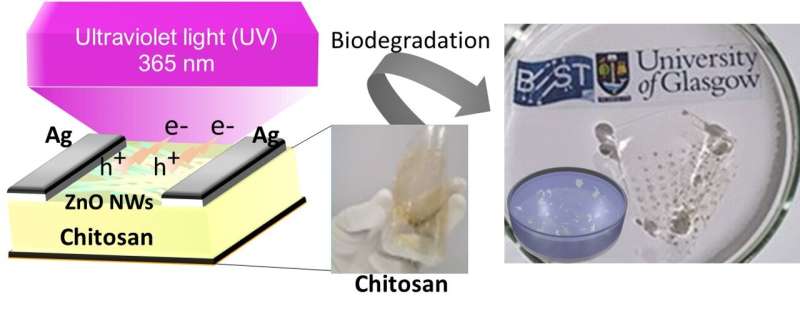Disposable, eco-friendly sensors for precise wearable dosimetry

A new publication from Opto-Electronic Advances discusses nanowires based degradable high-performance photodetectors for eco-friendly green electronics.
Sensor laden wearable systems hold great promise for wide range of applications including health monitoring, rehabilitation, electronic skin in robotics, environment monitoring, Internet of Things (IoT) etc. Often these applications, require cost-effective disposable sensors either for short-term or for single measurements. Single use sensors in wearables could also help overcome the typical challenges related to washability.
Likewise, disposable sensors could help address the hygiene requirements in health monitoring applications. Motivated by these requirements, Prof. Dahiya, and co-workers present ZnO nanowires based high-performance ultraviolet (UV) photodetectors on flexible, biodegradable substrate. The developed wearable, disposable device can accurately measure the UV light intensity. The sensing (ZnO nanowires) and substrate (chitosan) materials were selected to allow the device to harmlessly degrade in water during washing of sensors-integrated clothes. Chitosan as the substrate offers excellent chemical stability, good optical transparency, greater mechanical flexibility, and excellent biodegradability.
Similarly, the ZnO nanowires offer distinct advantages, such as (i) cost-effective synthesis, (ii) highly sensitive to UV light, (iii) environmental friendliness, (iv) biocompatibility and (v) biodegradability. Further, the fabrication steps used for disposable sensors are eco-friendly, scalable, and resource efficient. These include facile synthesis of chitosan based green substrates, spray coating of ZnO nanowires, and screen printing to realize contact electrodes. Thus, both during the development of sensors and the end of its life, negligible electronic waste is generated.
The Bendable Electronics and Sensing Technologies (BEST) research group, led by Prof. Ravinder Dahiya presents eco-friendly materials and resource-efficient fabrication route to develop wearable ultraviolet (UV) dosimeters, which can be safely disposed after their use and thus cause no adverse impact onto environment.
Uncontrolled exposure to UV radiation is a major cause for skin cancer. The excess exposure could also damage the DNA of genes and hence the skin cell growth. The amount of UV radiation reaching on earth surface varies from region to region. The seasonal UV intensity fluctuations, radiation leaks and diverse geographical locations make UV detection quite challenging. Significant research efforts have been made for the development of portable UV sensors, with novel form factors including flexible and/or stretchable.
Accordingly, many wearable and disposable consumer UV sensors have already been developed and are available in the market. However, disposability does not necessarily mean biodegradability, and this is where many of the reported devices fall short of expectations and do not fully address the growing issue of electronic waste (E-waste). Prof. Dahiya and co-workers present high performance disposable, wearable photodetectors having no adverse environmental impact during their fabrication as well as after the end of life.
Our environment is constantly evolving. It is our duty to preserve the environment for future generations. Currently, we are facing many kinds of challenging environmental problems. Few of these such as electronic waste or e-waster need urgent attention to preserve the ecosystem. E-waste constitutes of junked electronic gadgets and is one of the crucial current environmental problems that the world is facing.
The descending trend in cost and growing needs of ICT gadgets to perform our day-to-day activities, are leading to an increase in use of consumer electronic devices. This has led to an unparalleled growth of E-waste worldwide. For instance, in 2019, we generated a massive 53.6 million tons of E-waste. The "tsunami of E-waste" is further fueled by the coronavirus disease (COVID-19) pandemic which has led to virtual working becoming the new norm. Significant resources are needed for disposal, reuse, and recycling of E-waste. Further, large chemical waste (e.g., during photolithography and chemical etching etc.) is currently generated during the development of electronics. Thus, attention is needed both during the development of electronics and after the end of life to alleviate the serious threat we face for the environment sustainability.
Considering these aspects, Prof. Dahiya and his group have come up with an eco-friendly set of materials to develop transient UV sensors which physically disappear after their use. The use of sustainable materials and zero or low-waste fabrication processes in this work would trigger further research on transient electronics and help reduce the adverse environmental impact of electronics.
The developed high performance, conformal, and disposable photodetectors have been demonstrated to monitor exposure to UV radiations which is considered as one of the main risk factors to develop nonmelanoma and melanoma skin cancers. Further, the device could be integrated over nonplanar surfaces such as clothes or skin for wearable dosimetry. Such wearable and disposable patches can be used for real-time monitoring of UV radiation under diverse environmental conditions such as mountaineering activities. Lastly, such disposable and flexible UV photodetectors are critical for secure communication and environmental monitoring applications.
More information: Bhavani Prasad Yalagala et al, ZnO nanowires based degradable high-performance photodetectors for eco-friendly green electronics, Opto-Electronic Advances (2022). DOI: 10.29026/oea.2023.220020


















